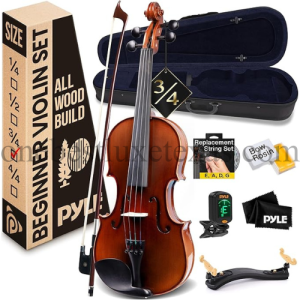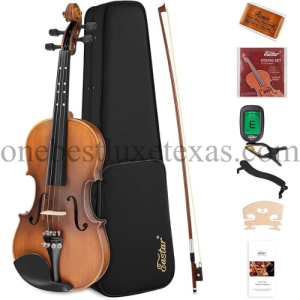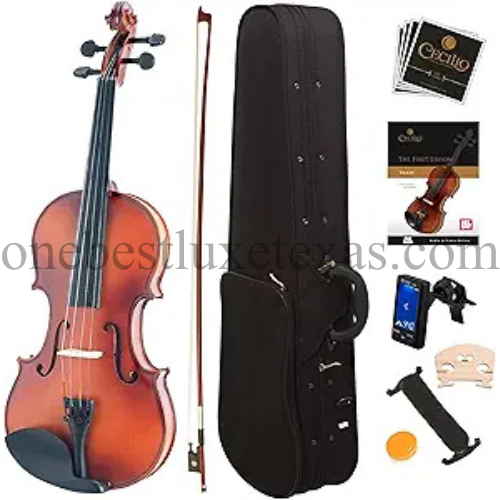Uncategorized
How to Choose the Best Violin for Beginners
How to Choose the Best Violin for Beginners
Choosing the right violin is one of the most important decisions a beginner can make on their musical journey. The violin, known for its rich sound and versatility, is an instrument that can take time to master, but the right one will make learning much more enjoyable. At Onebestluxetexas, we understand how crucial this first step is, which is why we’ve compiled a comprehensive guide to help you choose the best violin for beginners. Here’s everything you need to consider when selecting your first violin.

1. Understand the Different Sizes of Violins
Violins come in various sizes, and selecting the correct size is the first step in finding the right instrument.
- Full Size (4/4): This is the standard size for adults and teens.
- 3/4 Size: Suitable for younger players, typically between 9 and 12 years old.
- 1/2 Size: Ideal for players aged 6 to 9 years old.
- 1/4 Size: Best for children between the ages of 5 and 7.
- 1/8 Size and 1/10 Size: These are smaller violins, typically for very young beginners (under 5 years).
To determine the right size, measure the length from the child’s neck to the middle of their left palm. If you are an adult or teen, a full-size violin is likely the best choice.
2. Consider the Material and Build Quality
A beginner violin doesn’t need to be a high-end professional model, but it should still be made of quality materials that ensure durability and sound quality.
- Wood Type: Most violins are made of maple (for the back, sides, and neck) and spruce (for the top). These woods help produce the characteristic sound of the violin. Avoid synthetic or plastic violins, as they do not have the same resonance or tonal quality.
- Craftsmanship: Look for violins that are well-constructed with smooth, clean joints. While handmade violins are often more expensive, many beginners can start with mass-produced models that are still well-crafted and provide a good sound.
- Finish: A violin should have a nice finish, free from any cracks or imperfections that could affect the instrument’s sound or playability.
3. Check the Sound Quality
When shopping for a beginner violin, sound quality is key. While beginners will be learning basic techniques, it’s still important to start with an instrument that has a pleasant sound.
- Tone: Play the violin before purchasing (if possible) to listen for a warm, resonant tone. An instrument with a brighter, clearer tone is often easier to play and more rewarding for a beginner.
- Strings: Violin strings can greatly affect the sound. Many beginner violins come with synthetic strings, which are easier to tune and maintain than steel strings. You can upgrade to better strings as your skills progress.
4. Pick the Right Accessories
When choosing a violin, make sure to consider the accessories you’ll need to make your learning experience easier and more enjoyable. Essential accessories include:
- Bow: A good quality bow is essential for producing sound. Look for a bow that is well-balanced and made from strong materials (such as carbon fiber or Pernambuco wood). Many beginner violins come with a basic bow, but consider upgrading if you’re serious about learning.
- Case: A sturdy case is important to protect your violin from damage when it’s not in use. Make sure it’s padded and offers space for the bow, rosin, and other accessories.
- Rosin: Rosin is applied to the bow’s hairs to create friction against the strings. Most beginner violins come with rosin, but you may want to buy a higher-quality one as you progress.
- Shoulder Rest: This helps support the violin and improves comfort while playing. It’s an essential accessory for most beginners.
5. Choose Between New or Used Violins
While new violins are often preferred for their consistent quality, a used violin can be an affordable option for beginners.
- New Violins: A new violin from a reputable brand will typically come with a warranty and is less likely to have wear or damage.
- Used Violins: A used violin can be a good choice if you’re looking for something more affordable. However, make sure to check for cracks, repairs, or signs of poor maintenance. If buying used, it’s advisable to have the violin inspected by a professional before purchasing.
6. Set a Budget
Violins can vary greatly in price, from budget-friendly options to high-end instruments. For beginners, it’s important to set a realistic budget, but also to avoid the cheapest options, as they might compromise on sound and quality.
- Entry-Level Violins: These violins typically cost between $100 and $300. They are suitable for beginners and come with basic accessories. They may not have the best tone, but they are functional and provide a good starting point.
- Intermediate Violins: If you’re looking for a higher-quality instrument, you might consider spending between $300 and $800. These violins offer better sound, durability, and craftsmanship.
- Professional Violins: If you’re looking for a violin to continue with for many years, you may eventually want to invest in a professional violin, which can cost several thousand dollars. But for beginners, this is usually unnecessary.
7. Consult with an Expert or Teacher
If you’re unsure which violin to choose, it can be extremely helpful to consult a music teacher or expert at a local music shop. They can provide advice based on your specific needs, skill level, and budget. They can also help guide you through the process of trying out different violins to see which one feels best to play.

8. Test the Violin Before Buying
Whenever possible, try out the violin before purchasing. This is the best way to see if the instrument feels comfortable and if it produces a sound you enjoy. If you’re buying online, look for a store with a return policy that allows you to test the violin for a few days.
9. Choose a Reputable Brand
There are several brands that are known for producing high-quality beginner violins. Some reputable brands for beginners include:
- Cecilio: Known for making affordable violins that are great for beginners.
- Knilling: Offers excellent beginner violins with smooth, easy playability.
- Yamaha: Well-known for their durable and dependable violins.
- Stentor: Offers violins that are a great value for beginners.
Conclusion
Choosing the best violin for beginners is all about finding an instrument that suits your size, style, and budget while also providing a quality learning experience. At Onebestluxetexas, we’re committed to helping you find the perfect violin to start your musical journey. Whether you’re purchasing your first violin or upgrading your current one, we have a wide selection of violins and accessories to meet your needs.
Visit our store today to explore our range of violins and get expert advice from our staff. With the right violin, you’ll be ready to start making beautiful music!

